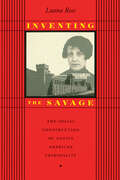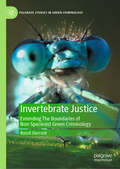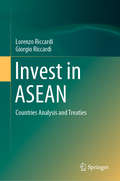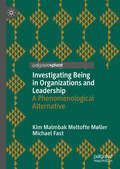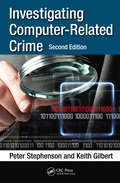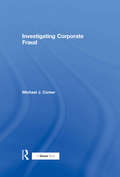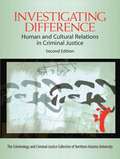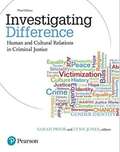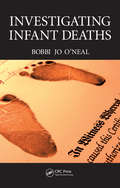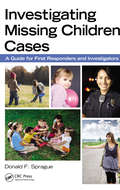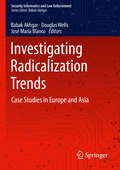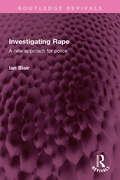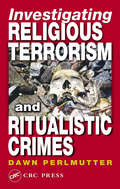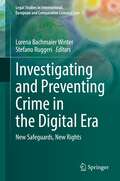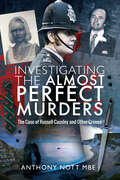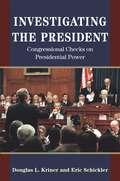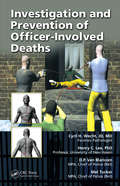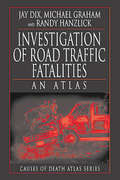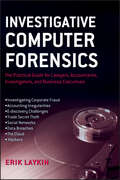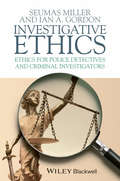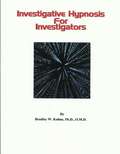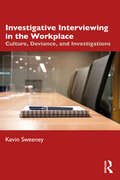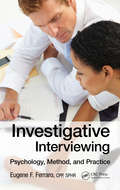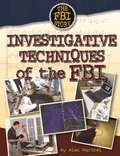- Table View
- List View
Inventing The Savage: The Social Construction of Native American Criminality
by Luana RossIn this pathfinding study, Ross draws upon the life histories of imprisoned Native American women to demonstrate how race/ethnicity, gender, and class contribute to the criminalizing of various behaviors and subsequent incarceration rates. Drawing on the Native women's own words, she reveals the violence in their lives prior to incarceration, their respective responses to it, and how those responses affect their eventual criminalization and imprisonment. Comparisons with the experiences of white women in the same prison underline the significant role of race in determining women's experiences within the criminal justice system.
Inventor's Notebook, The
by Fred GrissomThe best way to protect your invention is to keep good records. Let The Inventor's Notebook track - and prompt you to take care of - every important step in the process. Use it to: document the development of your invention help you make refinements while building and testing assess the commercial potential of your invention calculate how much capital you are likely to need organize your search for funds to build, test, manufacture and distribute your invention create a record of contacts who know of your invention and have signed confidentiality agreements The Inventor's Notebook also includes new patent rules for application and prosecution, up-to-date agreements and new forms. The perfect companion to Nolo's bestselling Patent It Yourself, this book includes: - worksheets - forms - sample agreements - instructions - references to relevant areas of patent law - a bibliography of legal and non-legal aids
Invertebrate Justice: Extending The Boundaries of Non-Speciesist Green Criminology (Palgrave Studies in Green Criminology)
by Russil DurrantInvertebrates are the neglected majority of the animal world. Even though they make up over 95% of animal life, they rarely feature in discussions of speciesism, animal ethics or species justice. This book aims to extend the work of non-speciesist criminologists to argue for the idea of ‘invertebrate justice’. Utilizing green criminologist Rob White’s (2013) eco-justice perspective, the book demonstrates how our interactions with invertebrate species (insects, crustaceans, molluscs and so forth) cause a significant amount of harm to those animals themselves (species justice), the ecosystems in which they are embedded (ecological justice), and ultimately to humans (environmental justice). Across three sections, it provides an overview of the ways in which humans and invertebrates interact across a diverse range of contexts and reviews the literature on both invertebrate biodiversity and invertebrate sentience; builds a theoretical framework that can help us understand what invertebrate justice might mean; and tackles the difficult question of how best we can promote invertebrate justice in the future. It appeals to academics, environmental scientists, activists and policymakers.
Invest in ASEAN: Countries Analysis and Treaties
by Lorenzo Riccardi Giorgio RiccardiThis book highlights the main features of the economic, commercial, political, fiscal and financial systems of each of the ASEAN countries from a domestic and an international point of view. Moreover, it analyses the most relevant international treaties signed by ASEAN’s members. Published after the 50th anniversary of ASEAN to promote the association, the book is a valuable tool for practitioners who are interested in developing economic activities or investments in this area.
Investigating Being in Organizations and Leadership: A Phenomenological Alternative
by Michael Fast Kim Malmbak MøllerThis book discusses the ontological foundation for organizational analysis and organizational life from a phenomenological perspective. The objective of this book is to provide the reader with an understanding of organizations that adequately takes into account the current philosophical knowledge regarding human nature. A key result of this analysis is that organizations are existentially founded human experiences of emotions, ethics, culture and narrative. This understanding of organizations is furthermore complicated by the existence of concepts of power, relationship, interaction and identity, which all can be perceived as contradicting notions of objectivity, professionalism and rationalism. The question is not whether this is an easy description to navigate nor apply, but rather where we go from here. This book would be of interest to students and scholars working on the philosophy of business, and academics in critical organization studies and alternative philosophy of organization. The book would also be of interest to people in all organization trying to understand everyday of dilemmas and contradictions.
Investigating Computer-Related Crime
by Peter Stephenson Keith GilbertSince the last edition of this book was written more than a decade ago, cybercrime has evolved. Motives have not changed, but new means and opportunities have arisen with the advancement of the digital age. Investigating Computer-Related Crime: Second Edition incorporates the results of research and practice in a variety of venues, growth in the fi
Investigating Corporate Fraud
by Michael J. ComerIn 1998 Gower published the highly successful third edition of Corporate Fraud by Michael Comer. Sadly, the need for such books has not disappeared - if anything it has increased - with cases such as Enron, WorldCom and the Allied Irish Bank and so this volume concentrates on the practicalities of investigating and recovering from fraud. Fraud can be prevented by secure processes and by ensuring that people allowed access to them are honest. This is easier said than done; failures will occur and every company needs contingency plans as a safety net. Contrary to popular belief, corporate fraud happens to good companies and effective managers. What is crucial is your reaction when suspicions are first aroused - fraud changes from a problem to a disaster mainly because people's initial response is ineffective. This book is a comprehensive action plan for organizations that are victims of corporate fraud. The aim is to help make sure that you can react swiftly and effectively, recover your money, your costs with interest and punish the offenders so that a deterrent is established for others. Most importantly the book will help you return to normal working as quickly as possible. It is highly practical, featuring checklists and case examples throughout. Applying his extraordinary experience, keen insight and vast practical knowledge, Mike Comer is able to take a unique position in showing organizations what they can do and what their rights are. His writing style is entertaining and enlightening - this is no dry, laborious and incomprehensible legal reference. You will find Investigating Corporate Fraud a fascinating and invaluable source of practical expert guidance on a subject strewn with potential dangers.
Investigating Difference: Human and Cultural Relations in Criminal Justice
by Lynn C. Jones Criminal Justice Collective StaffInvestigating Difference examines the full range of individual differences across the entire criminal justice system. Moving beyond just race and gender, it tackles differences based on experience, age, socio-economic class, disabilities and more. Written by a variety of leaders in the field, it looks at how these variances impact all people within the system, including victims, offenders, and service providers. This edition continues to emphasize positive solutions and includes new "case-in-point" illustrations that discuss how difference matters. For anyone interested in the criminal justice system with regard to diversity and multicultural issues.
Investigating Difference: Human and Cultural Relations in Criminal Justice
by Lynn Jones Justine Miller Sarah PriorFor courses that investigate race, class, and gender issues in Criminal Justice. <p><p> A deep exploration of justice―its meaning and administration―through consideration of difference Investigating Difference examines the full range of individual differences across the entire criminal justice system. <p><p>With a focus on positive solutions, the Third Edition moves beyond a prioritization of race to emphasize the multitude of social identity categories that matter in the justice system. Written by esteemed faculty and leading scholars in the field, this edition includes new chapters on intersectionality, specialty courts, and whiteness; newly authored and conceptualized chapters on gender, sexual orientation and gender identity, victimization, African Americans, Asian Americans, immigration, disability, and religion; a look at globalization and its impact on victims, offenders, and practitioners; and updated statistics and policy information throughout.
Investigating Infant Deaths
by Bobbi Jo O'NealMany forensic pathologists and death investigators would agree that infant deaths have historically been poorly investigated. Investigating Infant Deaths provides an in-depth guide featuring 40 case examples that illustrates real-life scenarios in which techniques are put into action. It explains techniques for interviewing grieving parents, how to perform an initial post-mortem exam, what to look for at the incident scene, and the goals of state and local child fatality teams. It also presents suggestions for using doll re-enactments to interview surviving caregivers and witnesses as well as 44 pictures of scenes and unsafe environments.
Investigating Missing Children Cases: A Guide for First Responders and Investigators
by Donald F. SpragueTime is an abducted childs worst enemy. Seventy-four percent of abducted children who are murdered are killed within three hours of their abduction. It takes, on the average, two hours for a parent to report a child missing. This gives responders only one hour to get an investigation up and running in an attempt to locate and recover the child ali
Investigating Radicalization Trends: Case Studies in Europe and Asia (Security Informatics and Law Enforcement)
by Babak Akhgar José María Blanco Douglas WellsThis book provides a detailed insight into the complex dynamics of radicalization that are in play amongst contemporary society. The authors focus on understanding emerging trends and models that can be used to analyse and understand modern violent extremist and xenophobic discourse. The chapters cover multiple regions, providing a collective analysis of country-specific case studies for the formulation of best practices, recommendations and learning material. It is recommended that this book may serve as a compendium for practitioners, academics, teachers and students wishing to gain state-of-the art knowledge. Topics covered by the authors vary from hands-on practical information to tactical, operational, strategic and ethical guidance. This book provides a holistic, harmonized approach based upon European internal security strategies recognizing that internal security cannot be achieved in isolation from the rest of the world. Additionally, this material resonates with the EU’s commitment to fight extremism in a rational manner, alongside promoting human rights, democracy, peace and stability within the EU Member States.Presents a comprehensive understanding of the interconnectivities and trends behind emerging radicalisation patterns;Features newest conceptual and practical knowledge to monitor, analyse and respond to radicalization around the world;Provides a comprehensive view into the methodologies for analysis, through visualizations, case studies and applications.
Investigating Rape: A New Approach for Police (Routledge Revivals)
by Ian BlairFirst published in 1985, Investigating Rape examines practices related with rape in four United States police departments and suggests what lessons the British police service might draw from them. The author urges greater recognition of the emotional trauma suffered by rape victims and the effects of that trauma on the relationship between victims and investigators. He recommends changes in police procedure, including new approaches in interviewing style and changes in training and in liaison with agencies who provide help to victims. This book will be of interest to any police official as well as to students of law and criminology.
Investigating Religious Terrorism and Ritualistic Crimes
by Dawn PerlmutterThe legalities of particular religious practices depend on many factors, such as the type of occult or religious activity, the current laws, and the intention of the individual practitioner. Written by the director of the Institute for the Research of Organized and Ritual Violence, Investigating Religious Terrorism and Ritualistic Crimes is the fir
Investigating and Preventing Crime in the Digital Era: New Safeguards, New Rights (Legal Studies in International, European and Comparative Criminal Law #7)
by Stefano Ruggeri Lorena Bachmaier WinterThe aim of this book is to delve into the impact of the Information and Communications Technologies in the criminal prevention and investigation, by addressing the state of the art of different measures and its implementation in different legal systems vis à vis the protection of human rights. Yet this research not only pursues a diagnostic goal but furthermore aims at providing a reconstruction of this problematic area in light of modern, human rights-oriented notion of criminal justice. This broadens the scope of this investigation, which encompasses both unprecedented safeguards to traditional, or anyway widely recognized individual rights and the emergence of new rights, such as the right to informational self-determination, and the right to information technology privacy.The book addresses the problems and potentials in the areas of criminal prevention and criminal investigation, taking into account that due to electronic surveillance and the progress in the use of big data for identifying risks, the borders between preventive and investigative e-measures is not clear-cut.
Investigating the Almost Perfect Murders: The Case of Russell Causley and Other Crimes
by Anthony NottA British detective superintendent recounts a remarkable ten-year investigation, and other compelling murder cases he worked in his long police career. Anthony Nott joined the Metropolitan Police in 1971, in a very different world from that of today. In this memoir he describes his early experiences in the Met, including the arrest of a man for murdering a prostitute in Kings Cross. He was present when a fellow police officer was almost stabbed to death, and witnessed an act of police brutality when he interrupted the beating of a petty criminal in a cell by the CID. In 1976, he transferred to the county force of Dorset where, not long after his promotion to detective sergeant, he engaged in what would be a ten-year long investigation into the disappearance of Monica Taylor, leading to the eventual conviction of her husband, Peter, for what was almost the perfect murder—Monica&’s remains were never found. He also recounts a series of other cases in which he was involved, from the murder and decapitation of a woman in Bournemouth and the random killing of another, to the extremely violent killing of a gay man in Boscombe Gardens, Bournemouth, in which it took two years to bring the perpetrators to justice. While he served as a DCI in Bournemouth in 1994, the chance visit of a detective sergeant from Guernsey, who was investigating a life insurance fraud, led to the reopening of a missing person enquiry from eight years earlier, and resulted in the conviction of Russell Causley for murder, despite his wife&’s body also never being recovered. This book provides an insight into the methodical and transparent way in which the police investigate complicated crimes—from riots to almost perfect murders.
Investigating the President: Congressional Checks on Presidential Power
by Eric Schickler Douglas L. KrinerAlthough congressional investigations have provided some of the most dramatic moments in American political history, they have often been dismissed as mere political theater. But these investigations are far more than grandstanding. Investigating the President shows that congressional investigations are a powerful tool for members of Congress to counter presidential aggrandizement. By shining a light on alleged executive wrongdoing, investigations can exert significant pressure on the president and materially affect policy outcomes.Douglas Kriner and Eric Schickler construct the most comprehensive overview of congressional investigative oversight to date, analyzing nearly thirteen thousand days of hearings, spanning more than a century, from 1898 through 2014. The authors examine the forces driving investigative power over time and across chambers, identify how hearings might influence the president's strategic calculations through the erosion of the president’s public approval rating, and uncover the pathways through which investigations have shaped public policy. Put simply, by bringing significant political pressure to bear on the president, investigations often afford Congress a blunt, but effective check on presidential power—without the need to worry about veto threats or other hurdles such as Senate filibusters.In an era of intense partisan polarization and institutional dysfunction, Investigating the President delves into the dynamics of congressional investigations and how Congress leverages this tool to counterbalance presidential power.
Investigation and Prevention of Officer-Involved Deaths
by Cyril H. Wecht Henry C. Lee D.P. van Blaricom Mel TuckerEach year, too many law enforcement officers die in the line of duty and too many people are killed by the police. Yet, can any of these deaths be avoided? To answer this we must investigate the nature and causes of these deaths in an unbiased and objective manner to highlight and expose weaknesses in policy that can be amended through more rigorou
Investigation of Road Traffic Fatalities: An Atlas (Cause of Death Atlas Series)
by Jay Dix Michael Graham Randy HanzlickThe screech of rubber against asphalt. And then the crash: a violent two-car collision resulting in a twisted mass of metal, plastic, and glass-and worse, the deaths of both drivers.Accident reconstruction is but one phase of road traffic fatality (RTF) cases. Even as police officers draw their last diagram, interview their last witness, and recons
Investigative Computer Forensics
by Erik Laykin"Having worked with Erik on some of the most challenging computer forensic investigations during the early years of this industry's formation as well as having competed with him earnestly in the marketplace...I can truly say that Erik is one of the unique pioneers of computer forensic investigations. He not only can distill complex technical information into easily understandable concepts, but he always retained a long-term global perspective on the relevancy of our work and on the impact of the information revolution on the social and business structures of tomorrow."-From the Foreword by James Gordon, Managing Director, Navigant Consulting, Inc.Get the knowledge you need to make informed decisions throughout the computer forensic investigation processInvestigative Computer Forensics zeroes in on a real need felt by lawyers, jurists, accountants, administrators, senior managers, and business executives around the globe: to understand the forensic investigation landscape before having an immediate and dire need for the services of a forensic investigator.Author Erik Laykin-leader and pioneer of computer forensic investigations-presents complex technical information in easily understandable concepts, covering:A primer on computers and networksComputer forensic fundamentalsInvestigative fundamentalsObjectives and challenges in investigative computer forensicsE-discovery responsibilitiesThe future of computer forensic investigationsGet the knowledge you need to make tough decisions during an internal investigation or while engaging the capabilities of a computer forensic professional with the proven guidance found in Investigative Computer Forensics.
Investigative Ethics: Ethics for Police Detectives and Criminal Investigators
by Seumas Miller Ian A. GordonInvestigative Ethics: Ethics for Police Detectives and Criminal Investigators presents applied philosophical analyses of the ethical issues that arise for police detectives and other investigators in contemporary society. Explores ethical issues relating to investigative independence, rights of victims and suspects, use of informants, entrapment, privacy and surveillance, undercover operations, deception, and suspect interviewing Represents the first monograph providing a detailed consideration of ethical issues in police investigations Features authorship by an applied philosopher specializing in police ethics, and a former UK senior police officer Combined authorship ensures the text is anchored in actual police practice as well as providing high quality ethical analysis
Investigative Hypnosis for Investigators
by Bradley W. Kuhns, Ph.D., O.M.D.This book will be of benefit to all those investigators who serve in Federal, State, County and City law enforcement. It will be especially helpful for those that use investigative hypnosis in their duty assignments. The book describes areas of investigative inductions, deepening techniques, instant sleep suggestions, wakening techniques andmuch more and the pages cover most anything the investigator would need to conduct a competent, successful investigative hypnosis session.
Investigative Interviewing in the Workplace: Culture, Deviance, and Investigations
by Kevin SweeneyBased on extensive interdisciplinary research and the author’s over 30 years of experience in the field, this book provides best practice skills for auditors and investigators in any type of investigation and adapts them to ensure they are relevant to a corporate environment where the powers available to police are absent. In addition to providing technical skills and practical advice on investigative interviewing, former police investigator Kevin Sweeney explains how to analyze information to assist in the investigation and to identify emerging trends to provide opportunities to prevent problems before they occur. Readers will come to understand legal concepts such as the chain of evidence, the psychological factors involved in questioning, and the sociological factors that can help to build a macro understanding of the organization and the event in question. This book will become an essential resource for professionals involved in auditing or investigation work of any type in the corporate or public sectors, in contexts including human resources, employee relation investigations, auditing, or where criminal activity is suspected.
Investigative Interviewing: Psychology, Method and Practice
by SPHR), Eugene Ferraro (CPPThere are few skills more important to the modern fact finder than the ability to obtain information through effective interviewing. While most interviewing books are intended for law enforcement, they often present harsh and accusatory techniques that can be counterproductive in private sector investigations.Investigative Interviewing: Psychology,
Investigative Techniques of the FBI
by Alan WachtelThe federal Bureau of Investigation (FBI) is a national agency dedicated to investigation federal crimes. Founded as a small team of special agents on July 26, 1908, the Bureau was first charged with enforcing the growing body of federal laws covering the United States as a whole. Almost from the beginning of its 100-year history, the Bureau has been the subject of legend and controversy. It has also evolved into a vast and sophisticated national law-enforcement agency. Whether as a federal crime-fighting force or a source of investigative support of local and state police forces, the modern FBI strives to embody its ideals of fidelity, bravery, and integrity. In 1993, a huge explosion rocked New York's World Trade Center, killing six people, injuring hundreds more, and turning the building's basement into a deadly underground cave. FBI investigators and explosives experts tracked down the bombers and gathered the evidence that sent them to prison. The methods the FBI used to solve that crime are representative of the techniques FBI agents use in a wide assortment of criminal investigations. From old-fashioned detective work to the most advanced forensic technologies, the FBI's arsenal of investigative techniques is vast, sophisticated, and growing.
